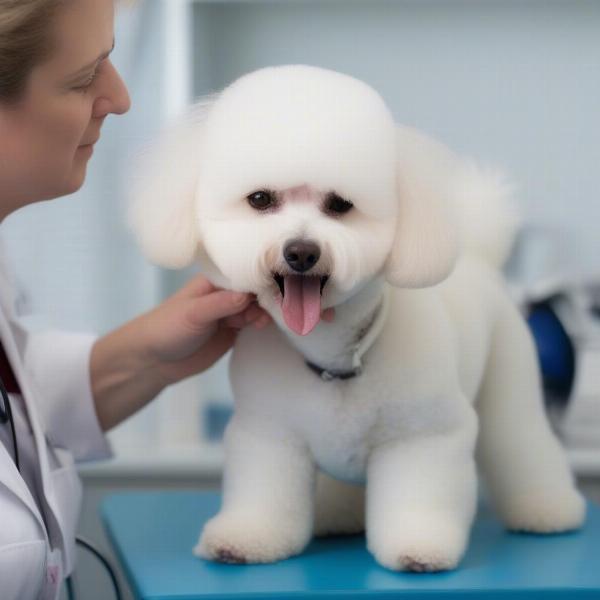Bichon rescue dogs offer a wonderful opportunity to welcome a loving companion into your home while making a difference in a dog’s life. These small, fluffy white dogs are known for their cheerful dispositions and affectionate nature, making them ideal family pets. This guide provides valuable insights into finding and caring for a Bichon Frise rescue, ensuring a smooth transition for both you and your new furry friend.
Why Choose a Bichon Frise Rescue?
Adopting a rescue Bichon comes with numerous benefits. Firstly, you’re giving a deserving dog a second chance at a happy life. Many rescue Bichons have experienced challenging circumstances, and providing them with a loving home is incredibly rewarding. Secondly, adopting is often more affordable than purchasing a puppy from a breeder. Adoption fees typically cover essential vetting, like vaccinations and spaying/neutering. Plus, adult rescue dogs often come with some level of training, potentially saving you time and effort.
Finding Bichon Rescue Organizations
Locating a reputable Bichon rescue organization is the first step. A quick online search for “Bichon Frise rescue near me” or “Bichon rescue dogs” can yield local results. Alternatively, check with national breed-specific rescue groups. Ensure the organization you choose is transparent about their adoption process, including their screening procedures and the care provided to their dogs.
Preparing Your Home for a Rescue Bichon
Before bringing your new Bichon home, make sure your environment is safe and welcoming. Bichons are small and can easily get into trouble, so puppy-proof your home by removing any potential hazards. Stock up on essential supplies like food, water bowls, a comfortable bed, toys, and grooming tools. Creating a designated “safe space” for your Bichon can help them adjust to their new surroundings.
Understanding Your Rescue Bichon’s Needs
Each rescue Bichon has a unique history and personality. Be patient and understanding as your new companion adjusts to their new life. Some may be shy or anxious initially, while others might be more outgoing. Provide plenty of love, positive reinforcement, and a consistent routine to help them feel secure. Observe their behavior closely to understand their preferences and any potential anxieties.
Health Considerations for Bichon Rescues
While reputable rescue organizations ensure their dogs receive veterinary care, it’s essential to schedule a check-up with your own veterinarian soon after adoption. Discuss any pre-existing health conditions and establish a preventative care plan. Bichons are prone to certain health issues, such as allergies and dental problems, so regular vet visits are crucial.
 Bichon Frise at vet checkup
Bichon Frise at vet checkup
Building a Strong Bond with Your Bichon
Forming a strong bond with your rescue Bichon takes time and effort. Engage in activities they enjoy, such as walks, playtime, and cuddling. Positive reinforcement training can help establish clear communication and build trust. Be consistent with your affection and attention, and create a loving and supportive environment where your Bichon can thrive.
Conclusion
Adopting a Bichon rescue dog is a rewarding experience. By providing a loving home and understanding their unique needs, you’ll gain a loyal and affectionate companion. Remember to be patient, consistent, and dedicated to their well-being, and you’ll enjoy many happy years together. Are you considering adding a dogs that don’t drool to your family? Or perhaps looking at different breeds of dogs nz?
FAQ
-
How much does it cost to adopt a Bichon Frise rescue? Adoption fees vary depending on the organization but are generally less expensive than buying from a breeder.
-
Are Bichon Frises good with children? Generally, yes, their gentle nature makes them suitable for families with children. However, proper introductions and supervision are always important.
-
Do Bichon Frises shed a lot? Bichons are considered hypoallergenic, meaning they shed very little.
-
What kind of grooming do Bichons require? Bichons need regular brushing and professional grooming to maintain their fluffy white coat.
-
Are Bichon Frises easy to train? They are intelligent and generally eager to please, making them relatively easy to train with positive reinforcement methods.
-
How much exercise do Bichon Frises need? They need moderate daily exercise, such as walks and playtime.
-
Where can I find reputable Bichon Frise breeders? While this article focuses on rescues, if you’re looking for a breeder, reputable breed-specific organizations can be a good starting point.
Ready to Welcome a Bichon into Your Life?
ILM Dog is a leading international pet website dedicated to providing expert advice on dog care and breeding. We offer a comprehensive range of resources, including breed information, health and wellness tips, training guides, and product recommendations. Our expertise covers everything from choosing the right breed (cavalier cross dogs are another popular choice) to ensuring your dog’s lifelong health and happiness. Perhaps you’re looking for bichon frise rescue dogs uk specifically? Or maybe you are exploring options like dogs for sale regina? Contact us at [email protected] or call us at +44 20-3965-8624. ILM Dog is here to support you every step of the way.